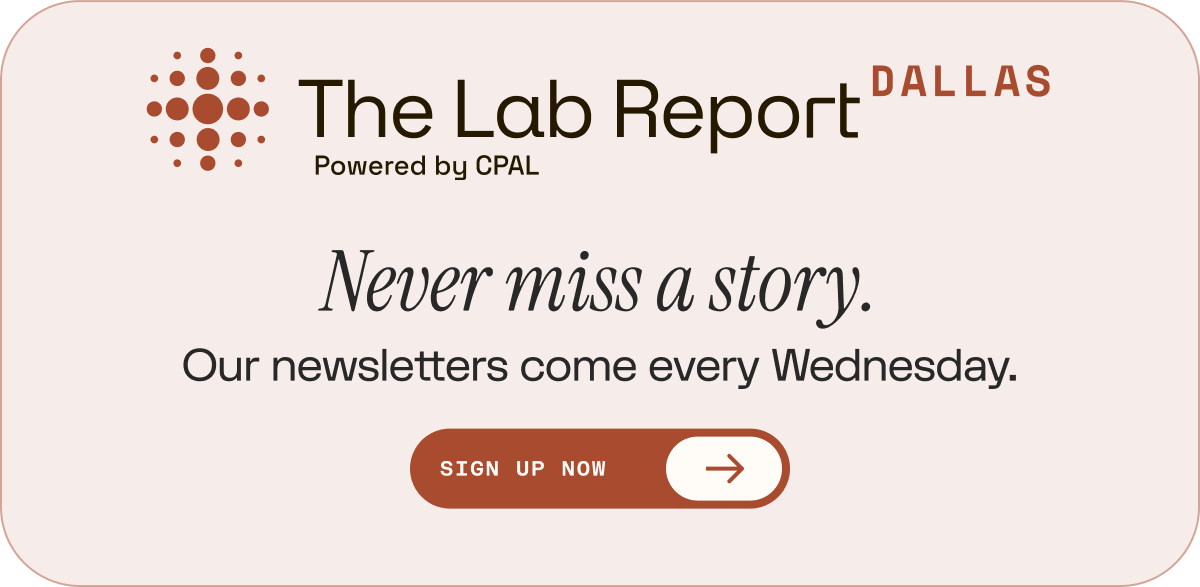- The Lab Report Dallas
- Posts
- Why Starbucks is Coming to South Dallas
Why Starbucks is Coming to South Dallas
The announcement itself is big news. But so is the story behind the decision to invite the national chain to the Forest Theater.
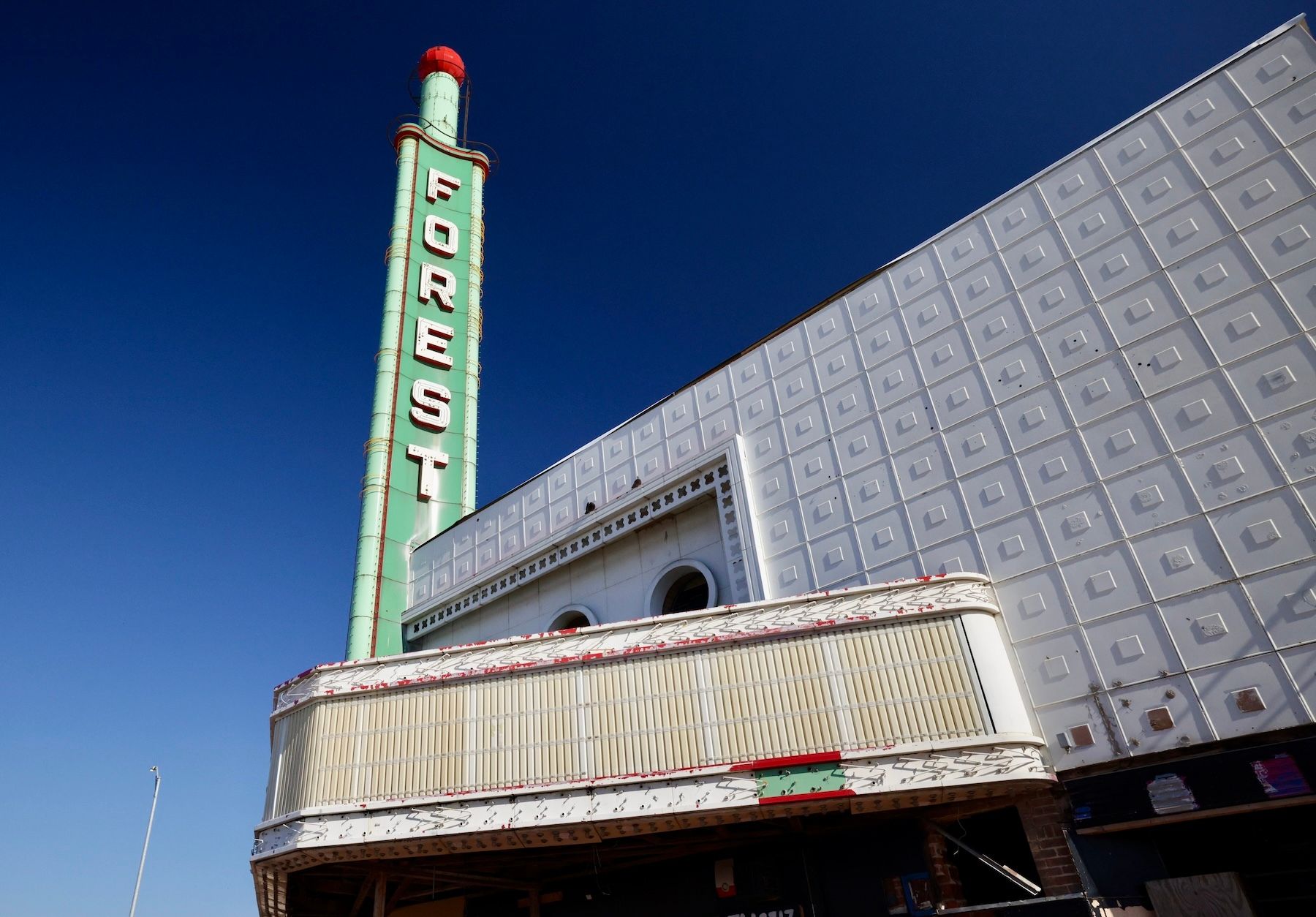
The Forest Theater will come back to life next November—its neighbor might surprise you. (Photo by Jason Janik)
A year from now, the legendary Forest Theater will reawaken, its iconic green tower and red ball shining again upon Martin Luther King Jr. Boulevard as a beacon of South Dallas’ rich heritage. Alongside the theater, the ambitious, yearslong redevelopment will welcome another familiar institution. Starbucks will be part of this transformation happening in the heart of 75215.
Elizabeth Wattley, president and CEO of the nonprofit Forest Forward, always knew a coffee shop would be part of the future theater complex. But she says no decision in her eight years leading the restoration has been more difficult than choosing this vendor. When the idea was first floated, she couldn’t imagine a Starbucks fitting with the historic neighborhood anchor.
If any deal was to go forward, Wattley insisted upon local control—and she got it. Under the license agreement with Starbucks, Forest Forward will leverage the brand but hire the coffee shop’s operator and select its design. “We get to embrace Starbucks as our own and do it differently,” Wattley says of the agreement, signed in October. “It’s a double win.”
While a Starbucks coming to South Dallas is itself significant news, the journey leading up to this moment is perhaps just as important—and a reminder of how complicated, difficult, and emotional the business of neighborhood revitalization can be.
Even as many who live and work in South Dallas lobbied for the coffeehouse, Wattley wasn’t sure. It wasn’t concern about the financials or the brand that kept her up at night; she recognized Starbucks would be an economic coup. She feared that bringing in a corporate outsider would send the wrong message to residents.
“The story goes that when you see a Starbucks coming into a historically underserved community, that is a signal for gentrification,” Wattley says. “That was, and is, the last signal that I want to give to this community.”
Research confirms that new grocery stores and coffee shops can be indicators of shifting demographics and higher housing costs, and Starbucks has for two decades been the butt of gentrification one-liners in films and comedy routines. But studies into the so-called “Starbucks effect” have found the chain’s coffee shop locations don’t fuel change but instead indicate it’s already happening.
“It’s heavy, what all must be considered in neighborhood building,” Wattley says of Forest Forward’s work, its epicenter at the corner of MLK and S.M. Wright boulevards, just east of Interstate 45. Every morning she would wake up with the same question: “When do we get to have excitement about big brands like a Starbucks coming to the neighborhood without the fear of it displacing people?”
Slowly, Wattley began to see how Forest Forward’s Starbucks could send a different message, that economic development doesn’t have to push people out. “I became determined to show that we can have assets, we can have resources,” she says. “We can have coffee and not be in fear that that is going to cause a mass displacement.”
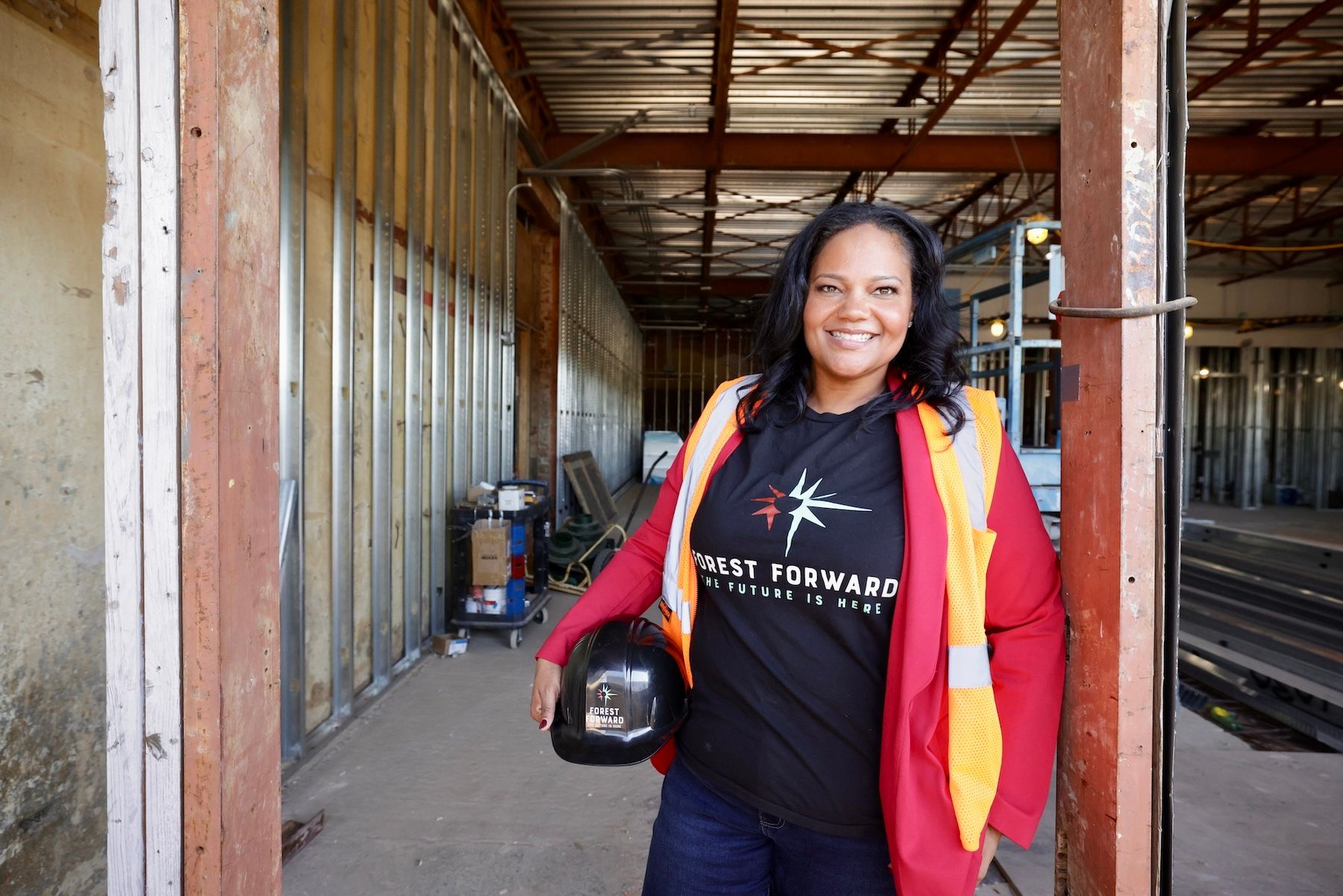
Elizabeth Wattley, the president and CEO of Forest Forward, stands in the doorway of what will be the Starbucks next to the Forest Theater. (Photo by Jason Janik)
When Wattley took the Starbucks idea to community members, she initially was startled by the overwhelmingly positive response. She estimates she has laid out the proposal to more than 500 people and the prevailing reaction has been, Yes, I want my latte. “People were calling out their orders,” she says. “They knew the Starbucks language. They just don’t have access to it.”
Back in the Forest Forward offices, two years of number-crunching and analysis left the team sure that Starbucks was the right business model. Priority one is for the revived Forest Theater to be successful, which means all the supporting players, including the coffee shop next door, must be sustainable. “Running a business is hard,” Wattley says. “We knew a big, recognizable global brand would turn heads and stop cars.”
In the moments when her resolve wavered about choosing Starbucks over a homegrown business, Wattley would remember the South Dallas neighbor who always stops her with this message: “Finally, Starbucks is coming—because we deserve one, too.”
Paul Quinn College President Michael Sorrell, whose unconventional ideas rescued the oldest historically Black university west of the Mississippi, understands the difficulties of revitalizing a community and, especially, presenting radical ideas in ways that are accessible and acceptable to people who don’t think in those terms.
Sorrell has one word for the future Starbucks location in South Dallas: Extraordinary.
“Whatever your personal feelings about it, Starbucks coming there is a stamp of monumental approval,” Sorrell says. “It tells all other investors, ‘This is going to work right now.’”
Wattley and Forest Forward’s vice president of strategy, Chris Dowdy, were part of Sorrell’s coaching tree at Paul Quinn. He describes them as two of the highest performers to come out of the HBCU’s ecosystem, and now they’re helping execute the ambitious redevelopment of a theater that has been shuttered for more than 15 years.
Their former employer, Paul Quinn, is located about six miles south of the Forest, in another underserved Dallas neighborhood that has struggled to attract the national brands so common north of downtown that they are taken for granted. Sorrell recalls telling Wattley and Dowdy when they worked together, “When you don’t have an A-list brand, you have to go make some A-list brand friends.”
Paul Quinn has partnered with Yale, Duke, and the University of Pennsylvania over Sorrell’s 18-year tenure, as well as with PepsiCo and the Dallas Mavericks. “Starbucks alone has that multiplier effect,” Sorrell says. “You don’t need five if you’ve got that one to stand up with you.”
When Sorrell drives through the Forest Theater area, he sees much that’s new, particularly the larger homes springing up on once-empty lots and the attractive street-level boulevard that replaced S.M. Wright Expressway and its infamous “Dead Man’s Curve.”
“Change isn’t coming to this neighborhood—it’s here,” Sorrell says. The community is lucky to have Wattley and her team leading the way, he says, because that’s the neighbors’ best chance to have any say in how the area develops.
The licensed-store deal Forest Forward struck with Starbucks also illustrates why owning the land underneath a project is critical for community transformation. Just as Cornerstone Baptist Church has purchased lots throughout South Dallas so it can control how that acreage is developed, Forest Forward brought the same negotiating power to the table with Starbucks. Wattley says she and her team worked every angle to ensure the coffee shop is connected to the neighborhood and reflects what makes both the theater and this corner of South Dallas special.
Soon the loud yellow-and-black “BROADWAY SHOES MFG OUTLET” sign, adjacent to the theater but only exposed once workers removed the complex’s long awning, will disappear. Pending the necessary approvals, Forest Forward expects the only Starbucks signage to be its iconic green-and-white medallion above the door and the brand’s name and logo on the big front window. “No neon, nothing flashy,” Wattley says.
The coffee shop will have its own entrance from MLK but a door inside will connect to the theater. When a show is not in progress next door, Starbucks customers may take their coffee into Forest Theater’s lobby or up on its roof.
“I became determined to show that we can have assets, we can have resources. We can have coffee and not be in fear that that is going to cause a mass displacement.”
The menu will be 100 percent Starbucks, although Wattley hopes to see a signature Forest Theater coffee drink added. The interior design and colors of the 1,500-square-foot space will reflect the elements of the historic complex. The art will be the work of community members and a small stage will allow for spoken-word performances. Several parking spaces by the front door will be designated for mobile-order pickups; a drive-through will not be built. Not only would that be impossible to construct at this site, Wattley says it doesn’t fit the “closeness and community feel” she wants for this coffee shop.
By year’s end, Forest Forward expects to select the local Starbucks operator, who also will lead food and beverage service at the theater. Wattley wants to hear neighbors’ points of view about operating hours, but she suspects 7 a.m. to 8 p.m. will be the preference.
As we walk the empty space that will become the Forest Theater Starbucks and admire the pink bricks, probably 75 years old, now exposed on the floor by the restoration, Wattley seems mostly at peace with her long-considered decision. “This Starbucks is being built for the neighborhood, and it’s ours,” she says. “It’s been a long road, but I’m excited. I’m excited to have a chocolate mocha.”
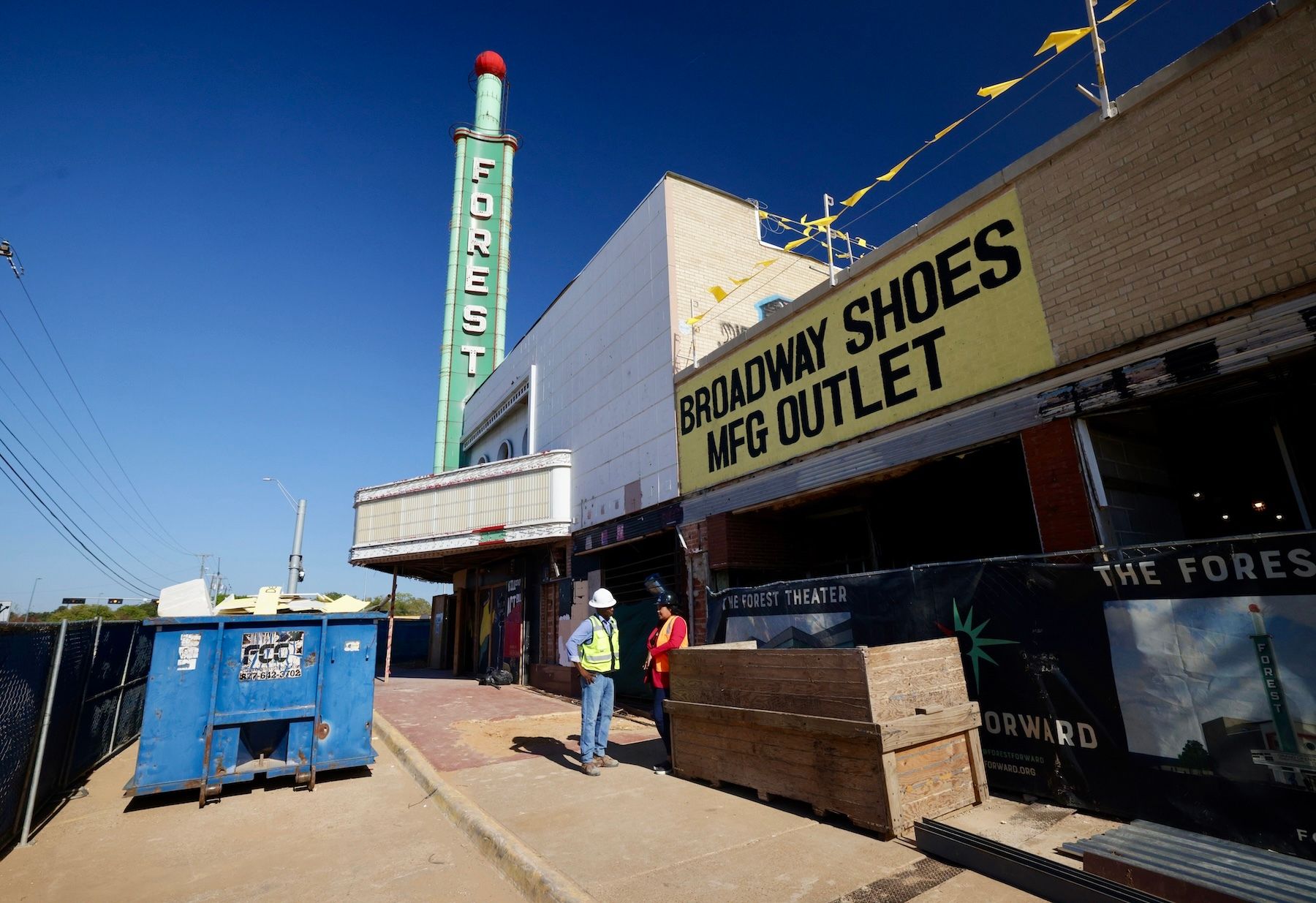
Renovation of the Forest Theater complex uncovered a sign advertising a shoe outlet that once occupied the space where Starbucks will open. (Photo by Jason Janik)
But almost mid-sentence, she pivots back to other aspects of community revitalization work Forest Forward is focused on. The restoration of the theater and the reimagining of what was previously a shopping center are only parts of a much bigger plan to improve outcomes for children and families who live in South Dallas. Forest Forward also has partnered with Dallas ISD to transform the Martin Luther King Jr. Learning Center into the MLK Arts Academy. In the last two academic years, 11 of the school’s eighth-grade graduates have been accepted into Booker T. Washington High School for the Performing and Visual Arts. Additionally, the nonprofit has acquired lots around the theater where it hopes to develop mixed-income housing.
Starbucks is Forest Forward’s first big win on economic development and the deal shows how serious Wattley is about turning lights on to other businesses committed to revitalization. “People tell us all the time that businesses won’t survive in our neighborhood,” she says. “We want to be able to demonstrate that they can indeed, and Starbucks can do that for us.”
Sharon Grigsby is the co-founder and senior writer of The Lab Report. [email protected].
Read More From The Lab Report:
Randy Bowman’s Radical Philanthropy At a time of great need, the founder of a nonprofit boarding operation believes philanthropic organizations can learn even more from the people they serve.
Has Oak Cliff’s Deck Park Won the Trust of Its Neighbors? Halperin Park will open in the spring over Interstate 35E, near the Dallas Zoo. Residents are watching closely.
The Perception and Truth About Violence in Dallas Despite numerous high-profile murders and violent crimes, the city is on pace for its largest decrease in homicides since well before the pandemic.
DART’s Big Problem and the Little Group that Wants to Solve It The Dallas Area Transit Alliance launched right as some of the public transportation agency’s suburban partners began pushing to defund it.
Deep Medicaid Cuts Come for Parkland The steepest reduction in the program’s history has the leaders of the county’s safety net system preparing for the unknown. Here is where things stand.
We’ll send a new story to your inbox every Wednesday. Have a friend who would appreciate it? We’d love for you to forward this email to them.
The Lab Report Dallas is a local journalism project published by the Child Poverty Action Lab (CPAL). Its newsroom operates with editorial independence.
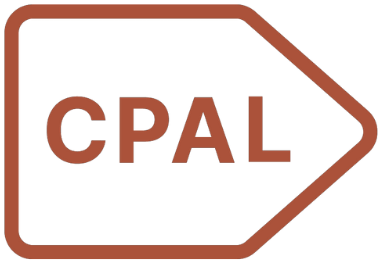
© 2025 Child Poverty Action Lab. All rights reserved.
